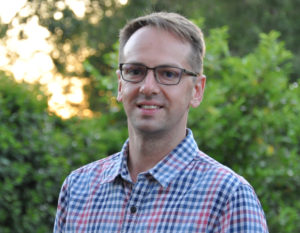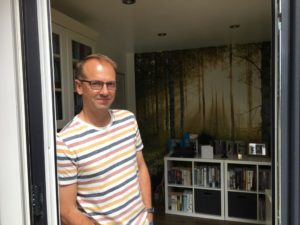I am delighted to publish this How They Do It interview with novelist and genealogist Nathan Dylan Goodwin. I love Nathan’s genealogical crime mysteries books starring his protagonist Morton Farrier, a forensic genealogist. (If you haven’t read them and you enjoy reading fiction, you’re in for a treat.) Nathan has been doing genealogy research since he was quite young and I was very interested to hear how he organizes his research. Nathan lives in Kent, England (which you’ll notice in some of his responses).
 How They Do It: Nathan Dylan Goodwin
How They Do It: Nathan Dylan Goodwin
How long have you been doing genealogy?
I started doing genealogy when I was twelve years old…I say started, but what I actually mean is spent an inordinate amount of time creating family trees and not really knowing what I was doing! I did have the presence of mind, though, to interview (on a basic level) several elderly relatives, including my great grandfather’s sister, who was born in 1895. At the wake after her funeral, I gathered up all of her unwanted photographs, which had been destined for the dustbin. It was around 1998 when my research became more serious and I began going to record offices, buying certificates, etc.
What’s your favorite thing about being a genealogist?
First of all, I love the puzzle-solving element of finding out about my relatives and discovering things about their lives, which nobody else knows. My second favourite thing is making contact with living relatives, something which has been really important to me since I started in genealogy. I’ve met so many wonderful distant cousins from all around the world and very often they are in possession of photos and documents, which I would never have come across from record offices or genealogy websites. One of my prized possessions is a family bible belonging to my great-, great-, great-grandparents, which was given to me by a 3rd cousin, about whom I knew nothing prior to tracing the siblings of my great-, great-grandparents down to living relatives. Seeing my interest, she very generously gave me the bible.
What’s your biggest challenge when it comes to organizing your genealogy?
Organising it! I’ve been the family genealogist for a long time now and so frequently get passed various family documents, which invariably need preserving as they are and also in some digital form, which can be shared with other interested family members. This process, as genealogists are aware, can be very time-consuming. So, I’m ashamed to admit that I have a lot of semi-sorted box files pertaining to each family name that I am researching.
What is your favorite technology tool for genealogy?
I’m a huge fan of anything DNA-related and am delighted with the development and release of analysis tools on Ancestry, GEDmatch and MyHeritage. My current favourite, though, is probably the tools available on the DNA Painter website. I’m very often using the ‘What are the Odds?’ tool, as well as Blaine Bettinger’s Shared cM tool. Love it!
If you were starting out new as a genealogist what would you do differently?
Had it been available at the time, I would have DNA-tested everyone in the family! I’m lucky to have my mum and maternal grandmother tested, but don’t have much on my paternal side. Other than that, I would ask far better questions of my elderly relatives. When I started out, I would ask questions about family members – names, birth dates, children, etc. – information I can now find within a few seconds online. I should have asked what life was like for them growing up, the personalities of their families, what pastimes they enjoyed, and any other questions, which cannot be found in other sources.
Do you keep a research log? If so, what format?
I do keep a written journal when I begin a complex genealogy problem, such as helping an adoptee find their biological family; something I have done several times, now. Owing to the complexities of such a challenge, it is easy to overlook something or forget areas of research which have been already explored. I usually note the date, what research I undertook and any next steps I need to take.
How do you go about sharing your personal research with cousins or other interested parties?
The main way in which I share my research is via my (private) Ancestry tree. I find this isn’t too overwhelming and is easily navigated. The line of my family, which I started working on at the age of twelve, was my grandmother’s maiden name, Dengate, and since 2002 I have maintained a website, www.dengates.com dedicated to the family name. It is also my one-name study. The website is currently undergoing a major overhaul, but once up and running it’s a great way to share information, stories, videos and photographs. Having the website also encourages others to share their information with me and other interested parties.
What’s the most important thing you do to prepare for a research trip?
Before any research trip, I always make sure the records that I want to see are actually going to be available to me and pre-order them, if I can, to save time. I have an on-going Notes file on my mobile phone and so add document references to it until I’ve built up a big enough list for a particular repository to justify a visit.
What’s your biggest piece of advice to genealogists in terms of organizing their research?
 I think everyone organises their research differently, so my advice would be to choose a way, which means that you can access something at a later date when you’ve built up a lot of material. Personally, I have (per family surname) a file for birth, marriage and death certificates (in chronological order), a file for wills, several for photographs, one for correspondence and one for artefacts. I must admit that my photographs files are slightly haphazard and need organising in a better way!
I think everyone organises their research differently, so my advice would be to choose a way, which means that you can access something at a later date when you’ve built up a lot of material. Personally, I have (per family surname) a file for birth, marriage and death certificates (in chronological order), a file for wills, several for photographs, one for correspondence and one for artefacts. I must admit that my photographs files are slightly haphazard and need organising in a better way!
Do you have a dedicated space in your home for doing genealogy research? What’s it like?
I have a cabin at the bottom of my garden, which I use predominantly for writing my genealogical crime mystery stories, but I do also undertake some genealogy down there, too. Otherwise, I’m sat at the dining-room table on my laptop!
A cabin at the bottom of a garden sounds like a delightful place to write and do research! You can read a short prequel to Nathan’s genealogical crime series at his website, www.nathandylangoodwin.com and the whole series can be purchased at Amazon and other retailers. Thank you, Nathan, for this peek at how you organize your research!
